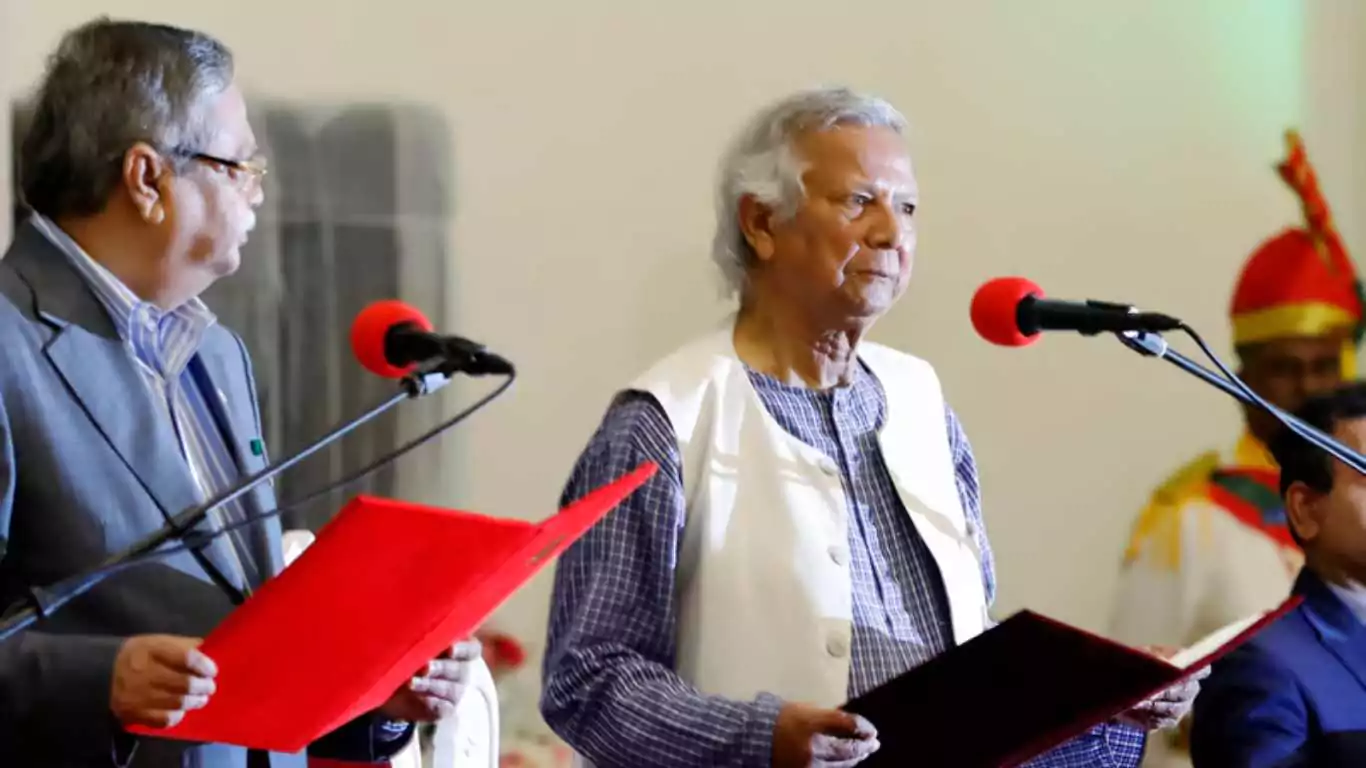Dhaka, the capital of Bangladesh, has undergone a dramatic transformation in the past few days. The once-prominent images of Sheikh Hasina, the former prime minister who fled the country on August 5th, and her father, Sheikh Mujibur Rahman, the nation’s founding figure, have disappeared from billboards. The walls that once boasted posters and slogans of the Awami League (AL), their party, are now adorned with vibrant graffiti reflecting the spirit of the protests that led to Sheikh Hasina’s departure. Messages like “Gen Z cleans the mess” and “Courage is contagious” illustrate the shifting sentiments of the city’s residents. A young NGO worker commented, “It’s very freeing to be able to talk openly about things after all these years.”
Shift in political landscape
The political landscape has shifted in tandem with the city’s appearance. Since taking office on August 8th, Muhammad Yunus, a Nobel Peace Prize laureate and renowned social entrepreneur, has spearheaded significant changes. Under his leadership, the interim government has swiftly overhauled key institutions, appointing a new chief justice and central bank governor. Additionally, pressure from students has led to the resignation of at least 16 university vice-chancellors. The government has pledged to prosecute those responsible for state-sponsored violence during the protests, dismissed cases against students, and initiated police reforms aimed at rebuilding trust in law enforcement.
As the city begins to recover, primary schools reopened on August 14th, with Dhaka’s metro scheduled to resume service on August 17th. Factories have restarted operations, and workers are returning to their offices. High-school and university exams, originally planned for August, have been postponed to September to give students time to recover and prepare. Police stations have also begun reopening, offering hope to residents who have spent recent weeks vigilantly guarding their neighborhoods at night.
Return to normalcy remains uncertain
However, the stability of this return to normalcy remains uncertain. Yunus’s position, while bolstered by army support and public backing, is legally tenuous. Sheikh Hasina’s abolition of the constitutional provision for caretaker governments between elections leaves Yunus in a precarious position. There is concern that Yunus may need to step down before implementing sufficient reforms to break the cycle of political retribution between the Awami League and the Bangladesh Nationalist Party (BNP), a pattern that has plagued Bangladeshi politics since independence from Pakistan in 1971.
The constitution mandates that an election be held within 90 days, but experts in Dhaka suggest Yunus needs more time to insulate the judiciary, police, and electoral system from political interference. “If we hold an election in two years, we may have a balanced political system,” said Major General Shahidul Haque, a retired officer and former ambassador. “But if we have one too soon, we’ll just end up with the same old thing.”
The reopening of police stations illustrates the potential for setbacks. Most stations are still staffed by soldiers, as police officers are reluctant to return due to fears of retaliation for their actions during the protests. General Haque warned, “The army does not have the capacity to do this forever, so they really need to redeploy the police as soon as possible.” The risk of ongoing unrest or martial law remains if this issue is not addressed.
On August 15th, the anniversary of Sheikh Mujib’s assassination in 1975, Dhaka’s law-and-order situation was tested. Traditionally, AL supporters hold large rallies on this day. The interim government declared it a normal working day, but with Sheikh Hasina urging from exile in Delhi, the AL called for a rally anyway.
Political parties exercising restraint
Political parties are currently exercising restraint, with calls for early elections tempered by a desire for a stable environment. “We support the interim government,” said Mirza Fakhrul Islam Alamgir, the BNP’s secretary-general. “We want an election as soon as possible, but the political environment needs to be ready for it.” However, if Yunus’s government falters, party leaders may shift their stance.
Another potential risk is the impatience of the students whose protests helped bring Yunus to power. The resignation of the former chief justice on August 10th, partly due to a large protest outside the Supreme Court, highlights the potential for further unrest. For Bangladesh to evolve into a vibrant democracy, Yunus’s government will need to act swiftly and decisively.


















